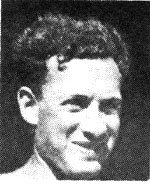Otenheimer (Eitan), Uri
He was born on January 7, 1921 in Stuttgart, Germany. Even as a child, the Land of Israel was in his Lev and in his thoughts. A young friend tells of a party held in Germany and carries an anonymous Jewish heroism: “At the end of the party Uri approached me – he was another child – and asked me if we too could be heroes when we were in Eretz Yisrael.” Uri immigrated to Israel from the city of Stuttgart in 1937 and came to Kibbutz Afikim with the second youth company, which consisted of young men from Jewish families from Germany. He was one of the most passionate and culturally minded people in society, and acted according to method and order in all fields of study. He was also well-versed in social life, was elected to various committees and was active in them. With his involvement in this activity, he took care of his family, who remained in Germany, to save her and bring her to Israel. After a period of work in kibbutzim in Mishmar HaEmek and Merhavia, he came to Habash Habashan. He took part in the construction of this new spot in the Upper Galilee, and wrote in his letter from its early days: “We have already been through two or three days, and it seems as though we have been here for weeks now. Important and valuable … “In the new kibbutz Uri continued to be a multi-verbatim. “You always think about ideas and plans.” When I came to your room, it was the work of ants, I would admire your aesthetic sense. … “. On the 26th of Kislev 5726 (26.11.1945), following anti-British sabotage operations within the framework of the “Jewish Resistance Movement”, the army and police surrounded the kibbutz Givat Haim. The police inspector called the kibbutz mukhtar and informed him that the trail of the terrorists who destroyed the Givat Olga police led to a kibbutz and that the police would conduct a census of all the members of the kibbutz. At the same time, messages were sent in a signal to the surrounding area, and many Jews began to flow to Givat Hayim from all sides. The army began negotiations with the kibbutz members and when they failed to meet its demands, the forces broke into the agriculture. In the meantime, men and women were moving from Ein Hahoresh to Giv’at Haim. An officer from the tank convoy ordered them to stop but they continued on their way, ran and fell, got up and continued to run. Among the runners was Uri. He fell near the Givat Hayim fence, was taken out of the fire and transferred to the hospital in Hadera, where he underwent surgery and died. He was 24 when he died. His friend from childhood wrote in his memory: “Uri the young man – the bright soul and the strong body … Bad from childhood in the distant fields of Europe, a friend in the days of our aliyah, a brother to the new life efforts, a friend to a friend’s enterprise and a partner in the hardships of creating a kibbutz in his fields. A passionate and passionate love of every radiant color, every flickering light, every sound emanating … and overcoming the wicked life of soldiers for the light-burning life of shady brothers; Kibbutz Lehavot Habashan published a booklet in memory of Uri.
